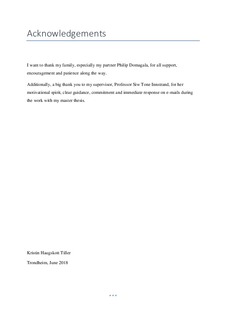| dc.contributor.advisor | Innstrand, Siw Tone | |
| dc.contributor.author | Tiller, Kristin Haugskott | |
| dc.date.accessioned | 2018-10-15T13:56:35Z | |
| dc.date.available | 2018-10-15T13:56:35Z | |
| dc.date.issued | 2018 | |
| dc.identifier.uri | http://hdl.handle.net/11250/2568079 | |
| dc.description.abstract | Som en positiv antitese til det mer velkjente konseptet utbrenthet, har arbeidsengasjement blitt stadig mer i fokus i forskning på arbeidshelse. Empiriske funn tyder på at det å fremme engasjement på arbeidsplassen fører til en rekke positive utfall, både for den ansatte og for organisasjonen, blant annet at sykepleiere ønsker å forbli i jobbene sine. Videre fører dette til stabilitet av sykepleierbemanningen på arbeidsplassen, noe som kan være av stor betydning med henblikk på store nedskjæringer i helsetjenesten i mange land i de seneste år. Som den største gruppen i helsetjenesten, har dette gått ut over sykepleiere i form av kutt i sykepleierstillinger og økt arbeidspress, hvor vi i tillegg ser en økende tendens til at stadig flere sykepleiere ønsker å slutte i jobbene sine.
Det fins mye empirisk kunnskap om organisatoriske faktorer som kan påvirke arbeidsengasjement eller mangel på sådant. Det er derimot lite forskning på hvordan personlige faktorer påvirker arbeidsengasjement og hvorfor det er sånn at enkelte er veldig engasjerte i jobben sin, hvor andre som jobber under samme arbeidsforhold er mindre engasjerte. I denne masteroppgaven er det fokus på personlighet og mestringsstrategier som personlige faktorer.
Masteroppgaven består av to artikler. Den første er en teoriartikkel som presenterer konseptene arbeidsengasjement, personlighet og mestring, samt tilhørende teori. Conservation of Resource theory forklarer dynamikken mellom individets opprettholdelse, tilegnelse eller tap av ressurser, og helseutfall dette kan gi. Videre skisserer Job Demands-Resorce theory at både jobbressurser og personlige ressurser påvirker arbeidsengasjement. I tillegg blir Temperament and Character Theory og Stress and Coping Theory forklart henholdsvis i forhold til personlighet og mestring. Med dette som teoretisk bakgrunn blir sykepleieres personlige ressursers relasjon til arbeidsengasjement diskutert.
Den andre artikkelen presenterer en empirisk kvantitativ studie. Dette er en longitudinell studie, utført i Norge, hvor sykepleieres personlighetstype og mestringsstrategier undersøkes i forhold til arbeidsengasjement. Når det kommer til personlighet, viste resultatene at både utholdende/iherdige sykepleiere og de med lav selvtillit opplevde lite engasjement. I forhold til mestringsstrategier var defensiv mestring og selvbebreidelse negativ assosiert til arbeidsengasjement, mens akkomodasjon og det å søke støtte hadde en positiv innvirkning på arbeidsengasjement. Artikkelen er tenkt skrevet til tidsskriftet Journal of Advanced Nursing. | nb_NO |
| dc.description.abstract | The positive antithesis to the well-known concept of burnout, namely work engagement, has been a popular topic under consideration in recent occupational health studies. Empirical findings indicate that promotion of work engagement leads to several positive job and personal outcomes, such as strengthened intensions to stay in the job as a nurse, subsequently supporting nurse workforce stability. This may be of great importance due to the major cuts in health services in many countries in recent years. As the largest group in health care, this has affected nurses by cuts in nursing positions and increased job demands. In addition, there is an increasing tendency that nurses to want to quit their jobs.
A lot of empirical knowledge about organizational factors that can affect work engagement, or lack of such, exists by now. However, there is few studies examining the influence of personal factors on work engagement in general, as well among nurses, and why some employees report high levels of work engagement whereas others working in the same environment do not. In this master thesis there is focus on personality and coping strategies as personal factors.
This master thesis consists of two articles. The first article is a theory article which presents the concepts of work engagement, personality and coping, as well as related theory. The Conservation of Resource theory explains the dynamics between the individual's maintenance, acquisition or loss of resources, and health outcomes. Further, the Job Demands-Resource theory outlines that both job resources and personal resources positively affect work engagement. In addition, the Temperament and Character Theory and the Stress and Coping Theory are explained in relation to personality and coping, respectively. With this as theoretical background, nurses’ personal resources’ relation to work engagement are discussed.
The second article presents an empirical quantitative study. This is a longitudinal study where personality traits and coping strategies among nurses are examined in relation to their work engagement. Findings showed that nurses with a persistent personality and those with a lack of self-esteem scored low on work engagement. Further, the results showed that nurses that seek support in stressful situations at work, and those who cope in an accommodative way, reported higher engagement, whereas self-blame and defensive coping were negatively related to work engagement among nurses. This empirical article has been written according to guidelines of the Journal of Advanced Nursing. | nb_NO |
| dc.language.iso | eng | nb_NO |
| dc.publisher | NTNU | nb_NO |
| dc.relation.haspart | Article 2: Personal resources and work engagement: a longitudinal study among nurses | nb_NO |
| dc.relation.haspart | Article 1: Personal resources and work engagement among nurses | nb_NO |
| dc.title | Do personal differences make a difference? – The influence of personal resources on work engagement among nurses | nb_NO |
| dc.type | Master thesis | nb_NO |
| dc.subject.nsi | VDP::Medical disciplines: 700::Health sciences: 800 | nb_NO |
| dc.description.localcode | Denne masteroppgaven vil bli tilgjengelig 13.12.2018 | nb_NO |
